An honest look at business in Austin
#WhyAustin is a special ongoing series featuring interviews with business leaders, politicians, and even outsiders. We’re taking a meaningful look at what makes Austin great while honestly examining the challenges our business and startup culture has.
Instead of talking about how Austin graces nearly every desirable Top 10 list ever published, we’re asking some of the most relevant names in business to opine. We’re interviewing company founders, politicians, startup investors, programmers, artists, musicians, and we’ve even interviewed leaders outside of Austin for their perspective. That is how you get honest feedback, folks.
#WhyAustin interview with Amy Simmons of Amy’s Ice Cream
In the video above, we chat with Amy Simmons, founder of the famous Amy’s Ice Cream. When we met, I was slightly fangirlish, given that Amy’s is so much a part of any Austinite’s life. My first date was at an Amy’s, the first place we went after college graduation was an Amy’s, many a 1:00am trip is still made to our nearest Amy’s. It’s the go-to for locals for special occasions (and just daily “I’m craving Amy’s”) and has always reflected the “Keep Austin Weird” vibe at every turn.
But for Amy it’s about so much more than ice cream, she’s churning out the next generation of entrepreneurs and getting her hands dirty.
Because the above video is a snippet of our interview, we’ve included the full transcript below. It’s chock full of business insight and honestly, inspiration. It’s one of the most honest perspectives we’ve heard to date, and there is no sugar coating here:
When did you move to Austin, what attracted you?
I moved to Austin in 1984 to start Amy’s Ice Creams. We had started a business plan, but we were looking at London. We went to London and the economy was flat, the weather was bad, and they really didn’t have great ice cream over there. The most popular ice cream was an animal fat-based ice cream. You had to also buy your lease up front.
We kind of came back from England with our tail between our legs saying, “This idea of opening an ice cream store, we’re going to have to go to med school,” or something horrible like that [if ice cream doesn’t work out]. We read an article in The Economist on the high-tech growth in Austin. We never had been here, we came down, and fell in love in two days.
Where did you guys move from?
Most recently I was in Coconut Grove, Florida but I’m originally from Ann Arbor, Michigan. I went to school in Boston, then I opened an ice cream shop in New York City for somebody else, then down in Florida. So directly here from Florida.
What’s the most attractive part to doing business in Austin?
The most attractive part, hands down, is the creativity and the people. It’s much like my hometown of Ann Arbor is a very liberal city in a very conservative state, Michigan. And here, Austin is a very liberal city in a very conservative state, Texas. All the cool, interesting people move here, and we get to work with that and serve them as customers. The spunk, the diversity, there’s just so much energy. I have kind of an eclectic, sarcastic sense of humor and it’s fine here. The biggest change in Austin in the 32 years that Amy’s has been open is the concentrated growth. It was very purposeful growth. The Chamber of Commerce identified it as one of their goals, is to grow population and grow jobs.
Austin has really, really, really expanded and created a lot of traffic. When you have a lot of people moving into the city all at once, there’s the people that have adapted to the culture of Austin, and then the people who come from somewhere else and bring their culture. I think it’s less distinct of a culture than it was when I moved here in 84.
What’s unique about Austin when it comes to expanding?
Having grown a company in many other cities, we have a shop in Houston, we had a shop in Dallas, and we’re in San Antonio. Of that subset of experience, Austin’s the most difficult. Not when we opened 32 years ago, but now. [There is a] tremendous amount of regulation. It was all passed very purposefully, but it seems like there’s a lot of unintended consequences.
The thing about Austin when I came down to visit and decide whether or not this is a good place to start a company, is that I’ve been all over the US. My mother was afraid of flying so we drove everywhere. We were in every state. Texas, and Austin in particular, has so many home-grown businesses. When I came down here to visit, Chewy’s had just opened, and so had Texas French Bread, there’s just no other city within the city limits that had so many unique, locally owned businesses.
My worry in the future is that the cost of development is really going to prohibit small business from opening. It really disproportionately favors the nationals. They come in and what they really want is a position in a cool city.
You think about South Congress, now we have Warby Parker, and American Apparel, and those are great companies. But what is South Congress? It’s the locals. And they’re tearing down the building that has Parks and Rec. I’m really worried about the future of small business, and that’s a big part of our unique culture.
What are the challenges when hiring talent in Austin?
We don’t have any challenges. We have such an incredible job and such an incredible culture within the organization that’s been built over those 32 years by every single person that’s ever worked for us; the ones who tell us who we’re not and the ones who tell us who we are. I think really Amy’s is a giant magnet.
We actually say you have to reach escape velocity to leave because there’s so much magnetic pull to stay there. We really value creativity, and individuality, and contribution.
We try not to have hierarchy. The whole environment draws really creative, intelligent people in.
How do you prioritize when pricing?
We certainly have the limitation of how much can you charge for an ice cream cone. We always consider our stake holders; we have four stake holders.
Our customers – we don’t want to charge them too much for the ice cream. It’s really horrible when you have a family of four and the parents have to cringe to pay for the kids’ ice cream, just have a day out with the family.
Our employees, paying them enough, paying them a living wage as the economy swells in Austin and the cost of living is prohibitive.
Then our share holders – when Amy’s was founded, I didn’t have any money. We wrote a business plan and we raised money from share holders. They’ve been with us for 32 years and they need a reasonable return on their investment or they’re not going to invest in our employees when they go out to open their own companies.
Then, the fourth is our suppliers. If you don’t pay them well then we’re not going to have dairy for making the ice cream next year. Wage is a really difficult part of, we want to pay a lot more, but we practice something called the great game of business and we’re zealots.
What is the great game of business?
It was a book from a guy named Jack Stack in Missouri in the very non-sexy business of major farm equipment remanufacturing. But what he did is really open his business up to all his employees. They’re blue collar, a lot of them with just high school education, and really believing in people and their ability to understand problem solving.
He taught finance to people who we might traditionally say “well, they wouldn’t understand it.” Their engagement was phenomenal, and that company has done incredibly over the years. He’s our mentor for our organization. We like to say “Amy’s, it’s a front.” It’s really a front for educating primarily young people in business, and finance, and decision making, and problem solving so they can go out in the world and be really successful themselves.
What businesses has that led to?
The first one was Ozone Bikes. It was a guy named Andrew Digas. I love Andrew, and it was right across the street from here! He would go to garage sales and buy bikes. He would clean them up and sell them for more. He ended up opening a great bike shop that ended up being Moto Cross Riders that were incredibly talented. Still many of them work for us occasionally, seasonally, today. That was the first business.
A Little City was a chain of coffee shops that really brought back Congress. That was four ex-Amy’s employees. Mrs Pea’s Electric Pot, that was an Amy’s employee.
Sweet Ritual [was founded] Valerie Ward who opened a vegan ice cream company called Sweet Ritual. Michael Hartman who worked for us from 1985 to 1988 went to New York City and opened a PR company that became the number one PR company that handled Broadway shows in New York City. He came back to be our CEO. He was very successful in New York. Really we have identified that as a goal of ours and we’re going to start really measuring it in the next two years. We have a lot of people on the platform ready to dive.
Is it true that Austinites are the most generous with their contacts?
Incredibly well put. Austin, networking is such a nasty word because it implies that your motive is personal gain. Austin does it in a real way, which is real relationships, really caring for one another, really supporting one another.
Instead of the scarcity model, Austin is really the abundance model. It’s not taking money out of your pocket by helping somebody even in a competitive industry. There’s enough for everybody in Austin. I guess that’s one way the growth is really positive.
Even in the ice cream industry, the sweets industry, lots of groups get together and support one another, and give best practices. When I first came down here I talked to Mike Young at Chewy’s, and I talked to Texas French Bread, Judy. It’s one of the things that made me move here, they were so forthcoming with information. Don’t pick a location on Sixth Street or across from the University. It might look obvious but you’re going to have a limited market over there. People were really, really, real advise. I agree, Austin’s networking is relationships, true relationships.
Which is the brightest – Austin’s past, present, or future?
I want to be optimistic about the future but I’m a little worried. I can’t help but say the past. There’s a lot that I really miss. A little bit more than 10 years ago, we identified what was going on with Austin’s growth and the worry for the small business market. We started purchasing property and developing it. There’s a number of other people who do this; Daryl Kunick who has Ace Taylors and is involved at UT, Peter Barlin, there’s some great folk in town doing this.
We purchase properties, mostly architecturally with some history, this was Now’s Grocery Store, Now’s drug store. We know the past.
We develop it inexpensively and then we lease way below market. We only lease to Austin businesses so we coined them Austin-villes. That’s been wonderful for us and for the businesses we’ve partnered with.
We’re also developing kind of an Austin-ville in Smithville, Texas which is about an hour from here. It’s this incredible small town. It’s this great downtown with fabulous old Texas buildings on either side. All of them were kind of boarded up. Because the cost of living in Austin has increased a lot, we’ve gotten a lot of really wonderful creatives to move down to Smithville and open businesses.
I think that’s one thing that’s a great byproduct is that maybe we help smaller economies that surround us. When we opened, we opened up north. When we first drove and looked at the land I was like, “It’s frozen wasteland.” There’s no architecture, there’s no sense of community, there’s no personality to this area that a lot of people were moving. We were able to create a meeting place by building an Austin-ville.
What does Austin need to do to attract more talent in businesses?
Don’t get me on my soap box. I think our society has become somewhat punitive. I don’t now about you, but when I’m driving down the street if a cop’s behind me I’m like, “Is my registration current? Am I driving 30 miles an hour, I want to go 31.” I feel like I’m a really honest citizen. I’m a non-rule breaker, but I still feel guilty.
I think code enforcement is really growing. [The department] started with two people 15 years ago and now, I don’t know, it’s 50.
You hear all these stories about code enforcement. We had been broken into, we had an 18-year-old employee who was really nervous and scared. We got on the scene and the code enforcement guy’s writing her a ticket for having a sandwich sign on the sidewalk. It wasn’t where handicapped people would go by. And if you go down to City Hall and you go around there I promise you there’ll be 10 sandwich signs there, so it’s inconsistently enforced. It’s a true story, but it shows, it’s an exaggerated example of what we shouldn’t do in this city.
We should partner with our businesses. And that doesn’t mean that you say yes more often. We have rules for a reason, but we’re partners. Some of the things Steve Adler has done as Mayor, I really appreciate. He really listens. Even city answering a telephone and saying, “How can I help you today?” Or from Chick-Fil-A, “My pleasure.”
Sometimes it’s just language and understanding that the city and the city government serves the population. I feel like that kind of effort, really small things like our language and recognizing we’re a community can really, really help.
And understanding local small businesses are valuable.
I think that one of the biggest things are development cost, real estate cost, and then our ability to get employees that can make a decent wage so we’re not charging incredible amounts for one cup of ice cream, but we can still pay the people who serve it so that they can live in this city. I think the great game of business, which we practice, really ends up giving you better margins in your business because everybody’s involved and everybody’s smarter than just one person. We’ve been able to increase our margins and get more money to our employees. That type of thing is a way that can really keep small business alive in Austin for a while.
Is Austin’s level of innovation ahead of the curve?
We are way ahead of the curve! Austinites really are limit testers, and we attract limit testers. It’s a wonderful thing. You think about Boston being a community with all those schools, well Austin’s really come up.
ACC is a great community college. When I couldn’t understand accounting at Amy’s early on I took accounting classes from ACC and really got engaged with it, and still have relationships with my professors from way back then. But also the University of Texas – we have a lot of students doing projects and internships. Then St. Edwards has come up – they might be even beating UT in terms of their student body and their presence in the community. Acton School of Business is a phenomenal, went way up on Princeton review. I think it’s number one in three categories, that’s a very innovative business school.
Then the people we attract, all the best companies are in Austin. I’m inspired. I can go any evening, I can go to some event where I’m learning something new.
How do you feel about Austin being on every single “Best Of” list?
I think it’s indicative of accomplishment and achievement. When I first moved here there was a magazine called Third Coast, but look at Chronicle and Lewis Black and what he’s done. Look at the tiny building it’s still housed in and the huge things that he does. South by Southwest, and how it’s expanded into education and film, it’s interactive.
I think it’s indicative of everything that’s happening here. ACL, Charles Attel, and Amy Corbin, they were little club owners and they did this huge thing. Now it’s all across the country, festivals have grown because of their model.
I think the attention we get is because of the innovation and accomplishment. Is it good or bad? You want people who are limit testers and creative to get attention so yeah, I love them getting attention. They deserve it.
What is Austin’s biggest business culture challenge?
In our business culture, I don’t know. I would love to get in there and help problem solve. I’m a big fan of [Austin Mayor] Steve Adler, he’s a really bright guy, puts a tremendous amount of energy in. I think it’s really frustrating because in business you could have one or two, or a team of leaders, they could make change and change the direction of an organization pretty quickly. The city government structure of Austin prohibits that from happening. It moves very, very slowly.
I had Billy Clayton who used to be the Speaker of the House, I went to graduate school with him. I’m like, “Billy, the government moves so slow.” He’s like, “It was designed that way.” You don’t want it as different.
I kind of get this low isn’t so bad, but how do we deal with our traffic problems? How do we deal with the homeless problems? How do we deal with the fact that all of our homeless services and charitable serves are clustered downtown which is where our tourism is, a lot of small businesses, a lot of the music industry is? We really want to help the music industry. It’s who we are, we’re the third coast. How are we going to do that?
We want solutions to these problems but the government isn’t built so that one person can steer it quickly. I think it will help to get a new city manager in. I hope we get a really wonderful city manager that has a great vision. I happen to love our police chief. Regardless of if you agree with him, he’s so forthcoming with information and he’s out there quickly and in a candid manager. I would love that in a city manager. I would love to feel like we’re all together in this and we can all make a change.
But something else, I think I really love the food trucks because that’s a lot of people to kind of test an idea. They’re not really sustainable. If you work in a food truck, you’re not going to make enough money to want to do that for 5 to 10 years. It is a wonderful way to test a concept and it can move into a brick and mortar.
What advice do you have for businesses hoping to open in Austin?
I would say the best advice is to find a local landlord. The local landlords often times are aligned in their values with the city and with you as a small business owner.
My first landlord is still a wonderful friend of mine. I didn’t have any credit, I wrote a hot check. He still tells the story today and feels pride in helping me get started, and then the impact that we’ve been able to have as a company on the city.
I think if you find a local landlord the chances are they’re going to ally with you. Like we’ve talked about, people really care about you and your success. Go to local businesses, similar businesses, don’t be afraid to ask the questions, ask the pitfalls, ask for help, and then definitely plan.
We talk about writing a business plan and it’s to get the money, you think you write the business plan to get the money, but you write the business plan so that by the end of writing it you don’t talk yourself out of that then maybe it’s a good idea. But your job is to talk yourself out of it, or mitigate all the risk points. As you’re writing it, they’ll all come to the surface and you get a chance to lop them off before they become a problem.
More leaders on #WhyAustin:
Below are some of the other locals we’ve chatted with. Want more? Subscribe, and you’ll get nothing but new interviews delivered to your inbox!
#WhyAustin with Patrick Terry, Founder of P. Terry’s:

#WhyAustin with Chris Hyams, President of Indeed.com:

Huge thanks to StoryCraft
Special thanks to our partners at StoryCraft for their phenomenal videography skills!
#WhyAustin
Lani is the COO and News Director at The American Genius, has co-authored a book, co-founded BASHH, Austin Digital Jobs, Remote Digital Jobs, and is a seasoned business writer and editorialist with a penchant for the irreverent.


































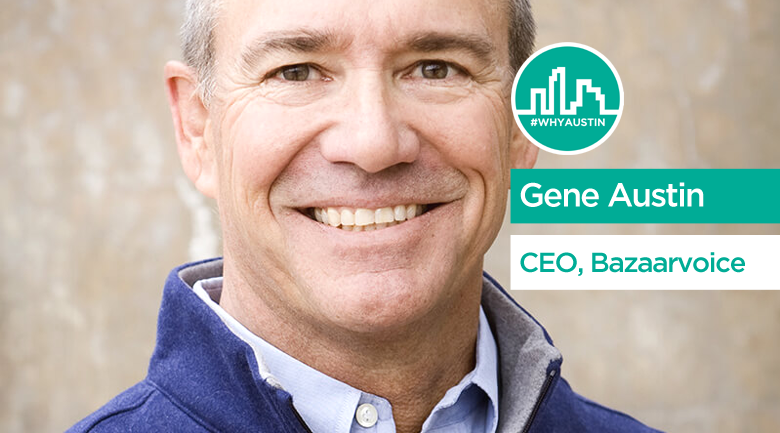
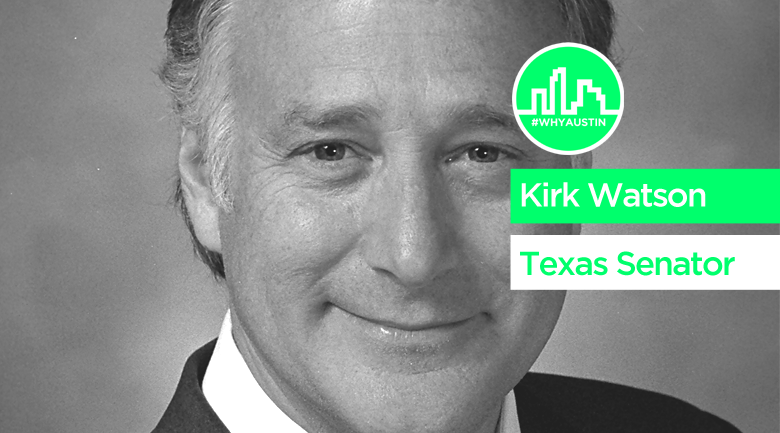

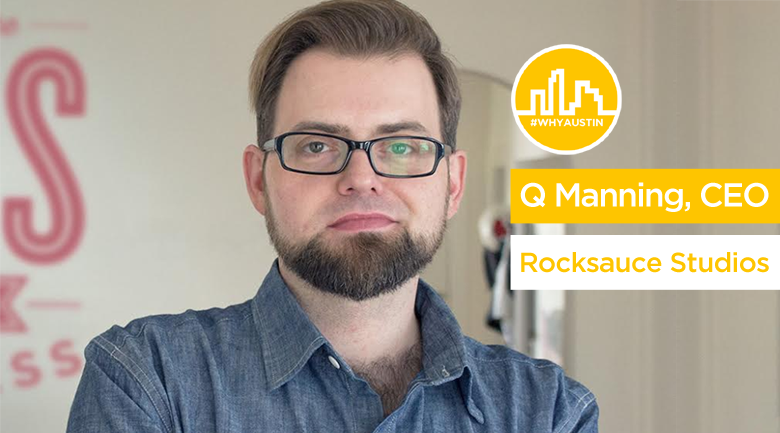
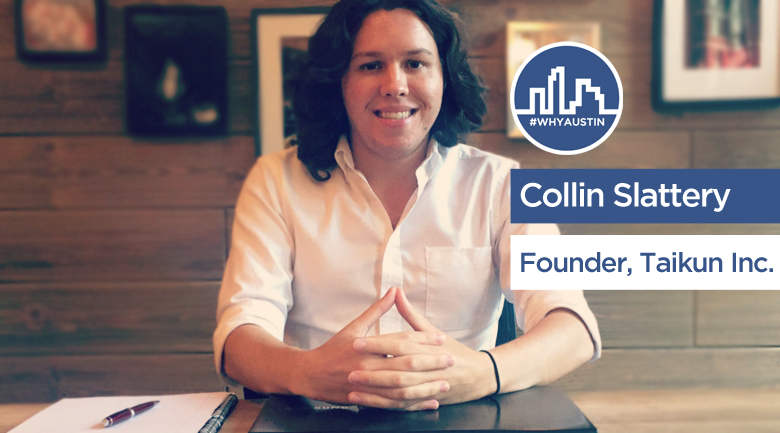
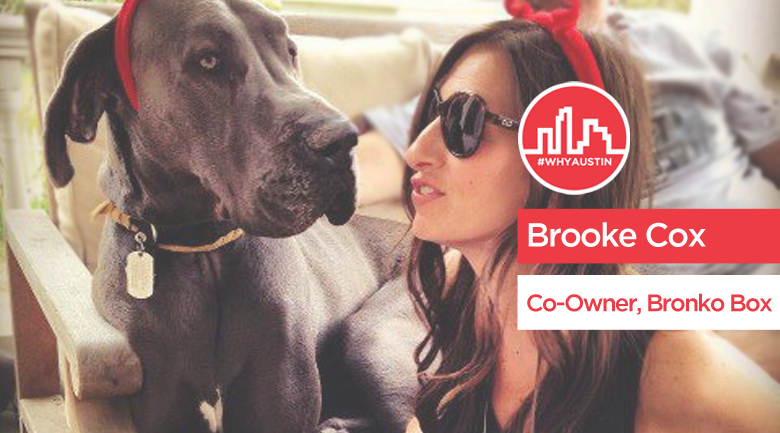
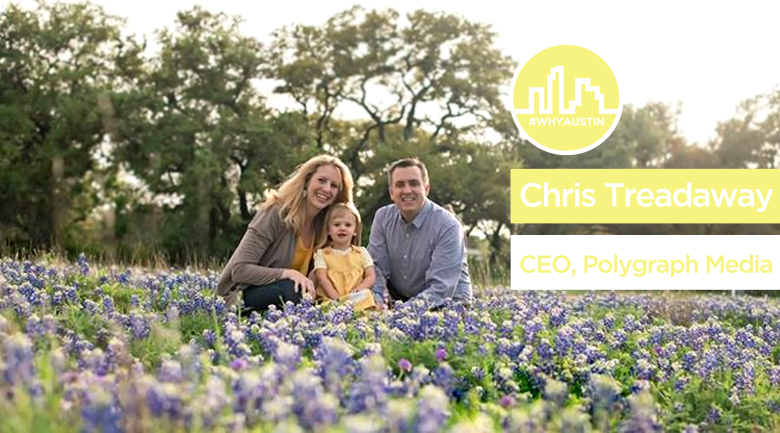



Pingback: How Amy's Ice Cream empowers all employees to become entrepreneurs - The American Genius
Pingback: b8ta is here, in Austin, to make all of your tech dreams come true - The American Genius